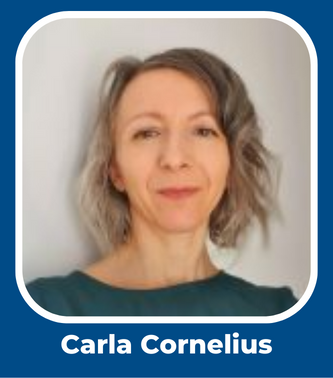
Carla is a Special Educational Needs Trainer and Consultant who has worked in early years education for several years, supporting settings to embrace the principles of inclusive practice. Carla’s journey in early years education started when she set up her own parent and toddler group ‘Oolygooly’ with her 12-month-old daughter as an ‘Assistant’. This experience developed her commitment to supporting parents/carers in raising children and strengthening their attachment bond, which may at times be negatively affected by the personal and environmental context. Carla was subsequently recruited to manage a Community Centre, where she continued to manage projects to enhance early play skills, community networking, parenting and play development in children with SEND. This was an invaluable experience which broadened her understanding of the community context and the wider social constraints which may hinder the family functioning. Carla’s professional career and experience eventually led her to become a Local Authority Early Years and SEN/Inclusion Advisor in Greater London, where she managed the Area SENCO Team providing advice, training and coaching to Early Years PVI settings. The training courses reflect Carla’s experience of Special Educational Needs, knowledge of Child Development and years spent working across a multitude of organisations. Carla has covered various roles as early years Practitioner, Manager, Mentor, Assessor, Tutor, and Local Authority Advisor. She has managed teams in the private, voluntary, and public sectors and led quality assurance processes. Carla cooperates with the delivery and Internal Quality Assurance process for the Certificates for SENCOs in the Early Years (CERTSEY) Level 3 qualification, the marking of the National Award for SENCOs (NASENCO), and is a freelance marker/tutor for Elklan Level 3 qualifications.
Aims and objectives:
Is bilingualism a barrier or an advantage for children with delayed language? This course aims to answer the question by exploring the current research studies on multilingualism in children with delayed language.
We will:
The course is based on current research in the studies of bilingualism, language development and neuroscience. The course also considers the influence of attachment on language development.
Links to Early Years and SEND guidance: Birth to 5 Matters 2021 (Personal Social and Emotional Development; Communication and Language; Understanding the World); SEND Code of Practice 2015 (‘The Graduated Approach’ points 5.36-5.46 and 6.44-6.56).
Audience: All Practitioners in Early Years PVI Settings and Schools
Language development is a central concern in the education field, particularly following the recent pandemic. The new curriculum guidance and government priorities focus on language development as a precursor of children’s academic progress and a foundation for better life outcomes.
Attention and listening skills are the base of communication and allow children to successfully access new skills and thrive in a social environment. In this course, we will look at the different levels of attention and how to support their development with practical ideas.
Links to Early Years and SEND guidance: Birth to 5 Matters 2021 (Personal Social and Emotional Development; Communication and Language); Statutory Framework for the EYFS 2021 (‘Managing Children’s Behaviour’ points 3.53-3.54); SEND Code of Practice 2015 (‘The Graduated Approach’ points 5.36-5.46 and 6.44-6.56).
Audience: All Practitioners in Early Years PVI Settings and Schools
Language development is a central concern in the education field, particularly following the recent pandemic. The new curriculum guidance and government priorities focus on language development as a precursor of children’s academic progress and a foundation for better life outcomes.
Understanding is a major component of language processing, both on a curriculum and social level. However, many children who have difficulty in this area of language are often not promptly identified in our educational settings, particularly when they are verbal.
During the course, we will:
Links to Early Years and SEND guidance: Birth to 5 Matters 2021 (Personal Social and Emotional Development; Communication and Language); SEND Code of Practice 2015 (‘The Graduated Approach’ points 5.36-5.46 and 6.44-6.56).
Audience: All Practitioners in Early Years PVI Settings and Schools
Enquire about making a booking for your upcoming training today: complete our brief form and we'll provide options, costings, and suggestions to meet your needs - or send us an email to discuss possibilities.
Complete booking enquiry formSend us an emailEarly Education
2 Victoria Square
St Albans
AL1 3TF
T: 01727 884925
E: office@early-education.org.uk